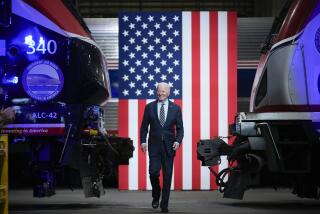‘92 Voters Better Informed, Survey Finds : Election: Presidential debates, improved media coverage and Perot ‘infomercials’ are credited for greater focus on issues than in 1988.
- Share via
WASHINGTON — Citing a variety of reasons, most voters say they were better informed about the issues facing the nation in the 1992 presidential race than they were during the 1988 campaign, according to a post-election survey released today.
The presidential debates, independent candidate Ross Perot’s “infomercials” and better media coverage all helped contribute to the impression--shared by 59% of the electorate--that there was a greater focus on the issues this year than there had been in previous campaigns, the poll results showed.
The survey by the Times Mirror Center for People & the Press showed that an even larger majority--77%--believed they had learned enough about the candidates and their positions to make an informed decision and cast their ballots with confidence this year. By contrast, only 59% of the voters expressed a similar degree of confidence in a post-election poll taken four years ago.
For all of the talk about voter anger, “the American electorate feels better about itself and better about the campaign process than it did four years ago,” the survey report said. “A large part of the increased satisfaction,” the report added, “ . . . appears to be related to a feeling among voters that ‘issues’ played an important role in the campaign.”
The nationwide survey of 1,012 voters was conducted from Nov. 5-8. The survey has an error margin of plus-or-minus 3 percentage points.
The survey found that a majority of Americans thought the candidates were treated fairly by the press, although fewer believed that applied to President Bush than to Democrat Bill Clinton.
According to the poll, 61% thought Bush had been treated fairly by the media, while 77%, thought that was the case for President-elect Clinton. Coverage of Perot was rated as fair and balanced by 67% of those who were questioned.
Despite these responses, the survey found that opinions of the quality of the media’s election coverage remain fairly low. Asked to grade the media’s performance on a scale of A to F, only 36% of the voters gave the press an A or a B. The coverage was given a C grade by 29%, while 31% gave the media a D or an F.
The 36% A or B rating represented a slight increase from four years ago, when only 30% of the voters gave the media those marks for their election coverage.
Perhaps not surprisingly, given the outcome of the election, the increase reflected a partisan split among those surveyed, with nearly twice as many Democrats as Republicans giving the press an A or B rating.
The survey also found that in forming their opinions of the candidates, voters said they relied far less on campaign commercials than on media coverage, interviews and the presidential debates.
Of those surveyed, 31% rated the debates as “very helpful” in deciding who to vote for, while 39% found them “somewhat” helpful. By contrast, in 1988 only 13% of the electorate rated the debates between Bush and Democrat Michael S. Dukakis as “very helpful.”
By a huge margin of 74% to 22%, the voters also said they got a better idea of where the candidates stood on the issues from television reports and newspaper articles than they did from the candidates’ own paid advertisements.
There was one significant exception to this finding: Perot’s series of lengthy “infomercials,” which 55% of those surveyed said were the “most informative” commercials of the campaign.
More to Read
Get the L.A. Times Politics newsletter
Deeply reported insights into legislation, politics and policy from Sacramento, Washington and beyond. In your inbox twice per week.
You may occasionally receive promotional content from the Los Angeles Times.










